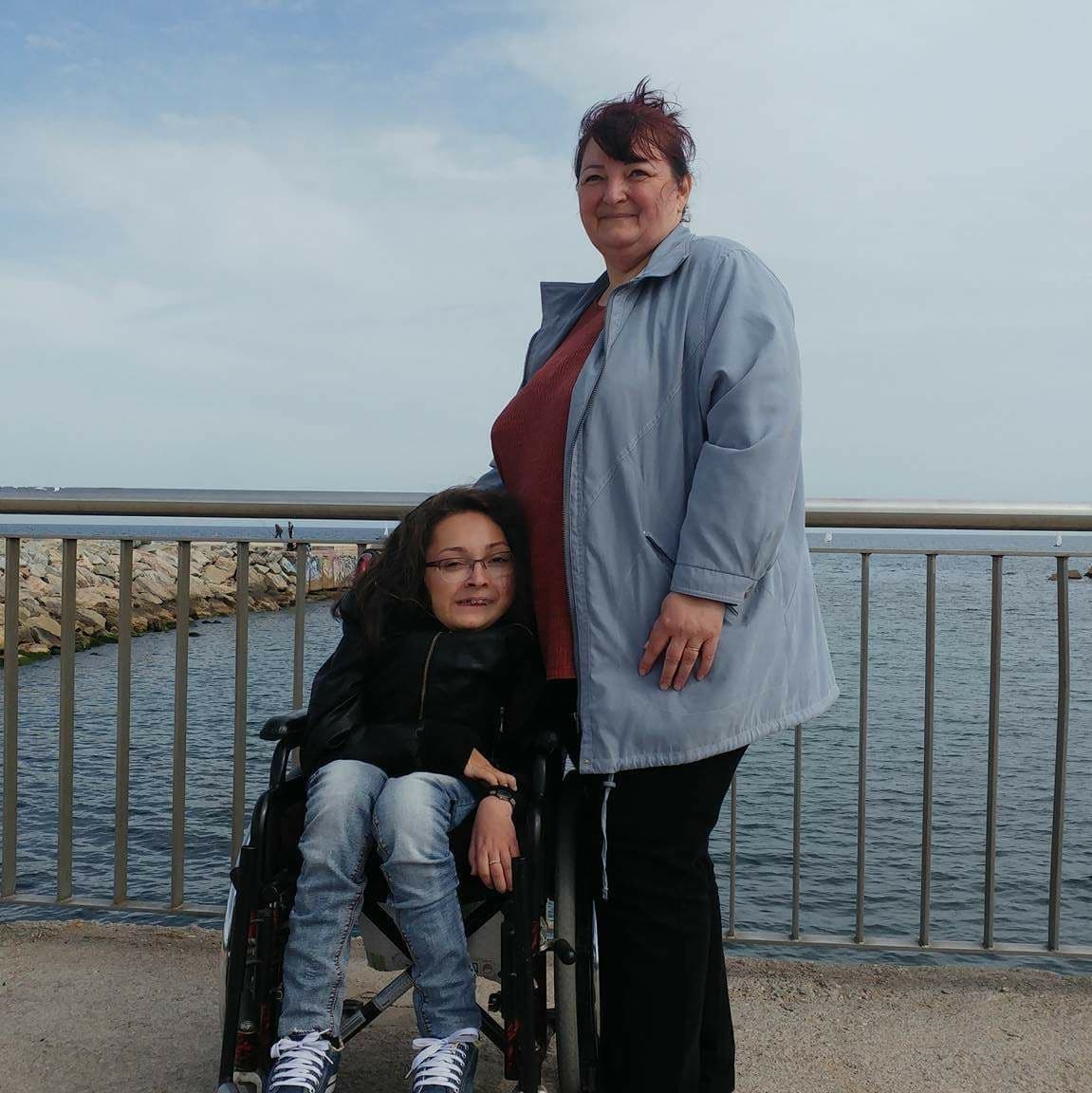Dana
Meet Dana
Dana and the many facets of access to medicines
Dana
Dana is a dreamer, or rather, as she puts it, an idealist. In the next year, she would like to move out of her parents’ house. Her mom would help her in the mornings, and she would hire a personal assistant for the afternoon, with her own money, earned on her job as copywriter. She would then sleep alone, with an assistance dog to help her roll over in bed at night. The thought is scary, but Dana feels ready to take responsibility of her own life.
Dana has always had plenty of plans for herself, but recently her outlook on the future has changed. One year ago, at the age of 27, she received her official diagnosis of SMA. Soon after, she was approved for treatment through SMA medicines.

Dana has always been very busy, too busy to let her disease slow her down. In her hometown in Romania, she was the first person with a disability to join the Erasmus programme in Spain. Top of her class, she won scholarships and graduated in economics. Dana likes to hang out with her friends, chat about what is new in their lives and in hers. She reads self-help essays and novels about love or World War II. She loves to travel, domestically and internationally, she visits restaurants and movie theatres, and just lives her life fully.

At 9 months old, Dana had been diagnosed with Werdnig-Hoffman syndrome, an old classification for SMA. Doctors warned her mother that nothing could be done for her, and she would not live past her fourth year of life. Thankfully, Dana disproved the doctors and survived this prognosis, and the family went on with their life. In her town, however, it was not easy to receive specialist care. During her numerous childhood hospitalisations for pneumonia, a neurologist would sometimes check in, but no care team was in place, except for physical therapists. Sure that not much else could be done for her, Dana invested her energies elsewhere.
Soon, going to physiotherapy appointments became tiresome and time consuming. The physiotherapy centre was far, and Dana and her mom travelled by public transport for a long time until her mom earned her drivers’ license. Home visits were unaffordable. At some point, Dana felt like she had to choose between physical therapy and school. She prioritized studying, as building a career and financial independency was a priority for her.
The first time Dana heard about medicines for SMA, it was through an acquaintance made during an online Facebook group for small businesses. Dana first rejected the idea of starting treatment: she did not have time to waste with doctors and was scared of going to hospitals, mindful of her hospitalisations as a child. A few months later, she received an invite to attend a conference on rare disorders in Bucharest. Here, she heard a doctor presenting about SMA and recognised herself in his presentation. She also met a young woman with SMA and noticed they looked very similar. This made her feel less lonely.
Dana decided it was time to act. She soon received an official diagnosis of SMA through genetic testing and started treatment through medicines within one month. At first, her parents were hesitant for her to try medicines that had just recently been approved. But, for the first time in her life, Dana felt like she was taking her life in her own hands. Medicines for SMA are available and reimbursed in Romania, but Dana had fallen into a combination of lack of information, diagnostic uncertainty, and daily life. Looking back, she regrets waiting this long.

Last month, Dana achieved something of which she is very proud. On a friend’s birthday, she was able to handwrite a “happy birthday” note for him. This was not without effort, but it was a big success. Maintaining hand function is important to her not only for writing, but also to retain her independence, as her hands allows her to drive her power wheelchair, for example.
Dana’s big dreams continue. She wants to launch an inclusive marketing agency staffed with people who are underrepresented in the workplace. Recently, she has also started volunteering for children living with SMA in Romania, in particular to facilitate their access to assistive devices, difficult to access in her country. Despite living with SMA her whole life, her journey in the SMA community and towards SMA care has only begun, and great prospects lay ahead.
Interview conducted on 4 November 2024.
Access is greater than access to medicine: it is also access to accurate information, well-informed care providers, and a patient community with shared experiences.
Stay updated!
Newsletter sign up
Keep up-to-date with the OdySMA project. Sign up to receive our digital newsletter
OdySMA is a participatory advocacy tool. Therefore SMA Europe cannot warrant the completeness, reliability, or absolute accuracy of the data shared on OdySMA, as there may be changes that our members and supporters do not immediately inform us of. Should you identify inaccuracies or omissions, please contact us and let us know. We count on you!